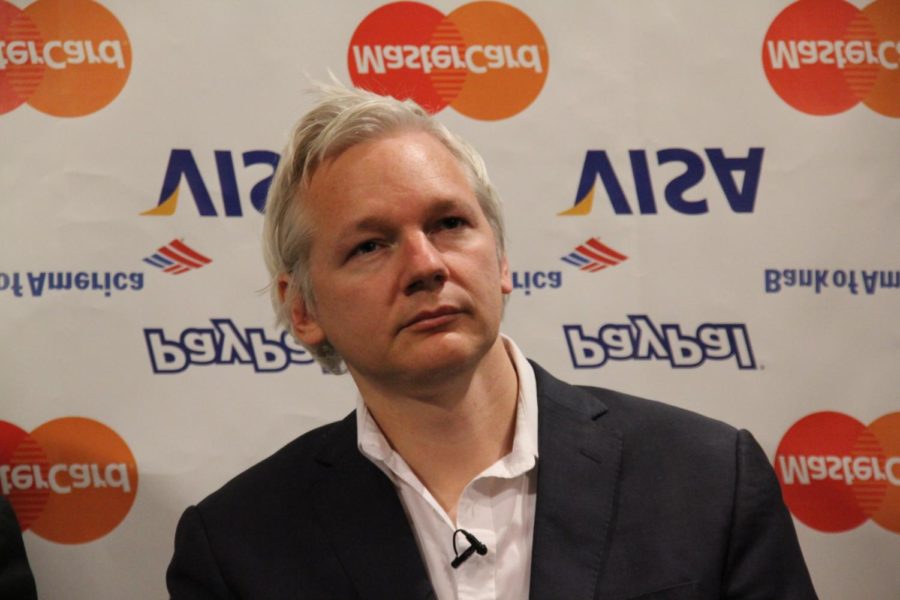Key people in WikiLeaks saga are divided on Assange extradition
Photo courtesy of Nick Thompson
WikiLeaks founder Julian Assange takes questions during a press conference at the Frontline Club in London on Oct. 24, 2011.
November 2, 2011
A court ruled Wednesday that WikiLeaks editor Julian Assange will be extradited to Sweden to face questioning over accusations of sex crimes made by two women, despite his legal battle to stay in Britain. Some key players in the WikiLeaks saga are split on how they feel about Assange, but they all agree the website’s future could be dire.
Assange said in October that he was temporarily suspending WikiLeaks publishing due to lack of funds, and it’s unclear whether the possibility of Assange going to jail will mean the death knell for its operations.
“Do I get personal satisfaction from Julian’s extradition? Well, I think Julian took Bradley for everything he was worth and hung him out to dry,” Adrian Lamo said Wednesday. Lamo is the California ex-hacker who claimed in the summer of 2010 that U.S. soldier Bradley Manning confessed to him in online chats that Manning had leaked classified wartime documents to WikiLeaks.
Lamo told his story to CNN.com shortly after a trove of secret Afghanistan war documents were published online on WikiLeaks and in three other mainstream media publications. Manning remains behind bars in Kansas; he has been held for more than a year and a half.
“[Assange’s] ego was so strong he thought he could bend light and get people to do whatever he wanted. He cannot,” Lamo said regarding Assange’s loss Wednesday in court.
Assange has refused to comment about whether Manning was WikiLeaks’ source for its Iraq or Afghanistan war logs or other diplomatic cables it has published in the past year. Manning has not commented about his alleged involvement in WikiLeaks.
“I hope WikiLeaks is more than just one man, and that despite the extradition and the enormous pressure, WikiLeaks will continue,” said Jeff Paterson, who is involved with the Bradley Manning Support Network, which raises money for Manning’s defense. Paterson founded the group Courage to Resist, which according to a document on its website, has raised nearly $400,000. The majority of that money pays for Manning’s private legal counsel, Paterson said, and the rest pays for numerous protests the group has staged in support of the soldier. WikiLeaks contributed $15,100 in January.
“I hope Julian Assange gets a fair hearing [in Sweden],” Paterson said. “No matter what happens I feel confident people will continue to stay focused on Manning’s case.”
The Electronic Frontier Foundation, a First Amendment advocacy group, said the extradition order could send a chill through journalism.
“The real danger to Internet and press freedom is if Sweden now decides to extradite Assange to the U.S. for charges unrelated to what he’s facing in Sweden,” said spokesperson Trevor Timm.
Daniel Ellsberg has been a prominent defender of Manning. The 80-year-old who famously leaked the Pentagon Papers in 1971 purposely got arrested in front of the White House in March while trying to call attention to what he said was Manning’s unjust treatment.
“This is not the end of the story here,” said Ellsberg, noting that another hearing later this month will be held if Assange can appeal the extradition order.
He doesn’t think Wednesday’s news about Assange will deflate support for WikiLeaks, Assange, Manning or the effort to leak documents online in any forum.
“I certainly feel that Assange has done, on balance, a very great service to our country and the world with these disclosures he has published,” Ellsberg said. “That doesn’t mean that I agree with every decision that he has made, or that he’s made no mistakes.”
Ellsberg called Assange a “hero” of his.
“I would like to see him continue to operate,” he said.







